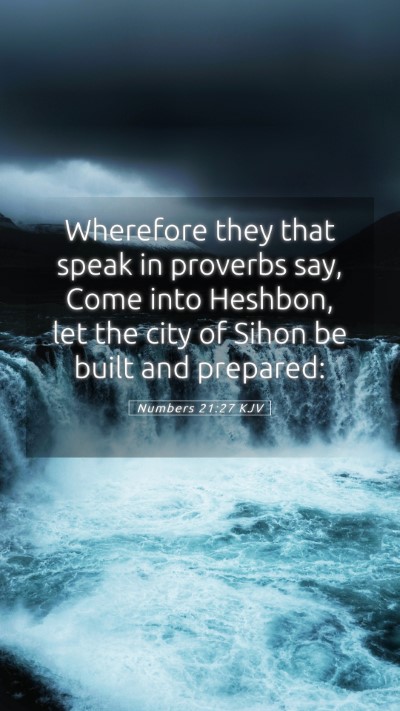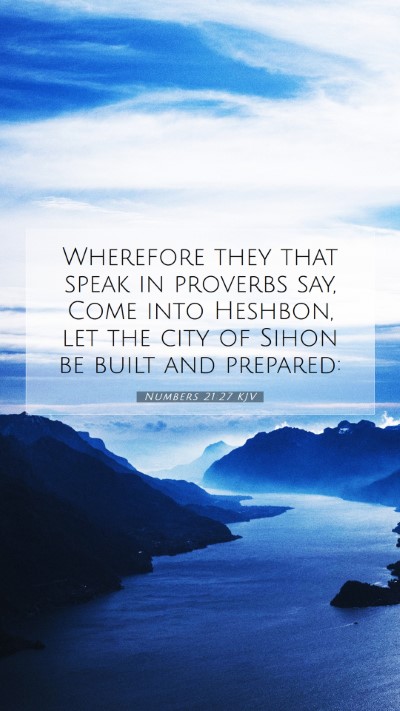Understanding Numbers 21:27
Numbers 21:27 states: "Therefore, the ballad of the sages, say, Come to Heshbon; let the city of Sihon be built and established." This verse encapsulates a moment of celebration following a battle, reflecting the Israelites' victory over their enemies. The interpretation of this verse can be enriched by insights from public domain commentaries.
Context and Background
This verse refers to the aftermath of Israel's conflicts with the Amorites, particularly the king named Sihon. The Israelites, led by Moses, sought passage through the land, but Sihon refused and attacked. In response, the Israelites defeated him, a pivotal moment captured in this verse.
Significance of Heshbon
Heshbon, mentioned in the verse, was an important Amorite city. The call to establish it reflects the Israelites' claim over the land. It symbolizes their triumph and God’s providential support in their journey to the Promised Land.
Commentary Insights
Matthew Henry's Commentary
Matthew Henry emphasizes that this verse highlights the joy and celebration following Israel’s victory. It signifies the importance of remembering and proclaiming God’s deliverance. Henry notes that such victories should remind believers of God's faithfulness and inspire them to build their lives upon the foundation of His promises.
Albert Barnes' Commentary
Albert Barnes elaborates on the meaning of "Come to Heshbon." He suggests that it reflects a deliberate call to unity among the Israelites, inviting them to join in the celebration of God’s deliverance. Barnes also indicates that Heshbon becoming a focal point symbolizes taking bold steps in faith.
Adam Clarke's Commentary
Adam Clarke brings attention to the historical context of Heshbon, noting its prior significance among the Amorites. Clarke points out the playfulness of the verse, suggesting that it is part of a song that celebrates and recounts the victories attributed to divine intervention. This reinforces the understanding that God's actions are worthy of celebration and remembrance.
Biblical Exegesis
Through biblical exegesis, this verse can be seen as part of a larger narrative that illustrates God's sovereignty and His commitment to guide His people. Understanding Scripture involves recognizing how historical events are transformed into prayers and songs, serving as lasting testimonies.
Cross References
- Deuteronomy 2:24: God's instruction to Israel to contend with Sihon.
- Numbers 21:21: The request for passage through the land of the Amorites.
- Joshua 12:4: The description of Sihon as a defeated king.
- Psalm 136:19-20: A song celebrating the defeat of powerful kings.
- Isaiah 15:4: Mention of Heshbon amidst pronouncements of judgment.
- Matthew 5:14: Light in darkness, reflecting on how the Israelites became God’s beacon.
Application and Reflection
Applying the message of Numbers 21:27 involves recognizing the victories God has granted in our lives. Just as the Israelites sang of their successes, believers today can reflect on personal triumphs, using them as testimony to God’s faithfulness. This evokes gratitude and a sense of community among believers as they share their experiences in Bible study groups or online Bible study sessions.
Conclusion
Numbers 21:27 serves as a reminder of the significance of God’s guidance in times of conflict and the importance of communal praise and remembrance. Through careful biblical study and reflection on public domain commentaries, individuals can deepen their understanding of scripture and engage with the larger narrative of faith. Such insights foster a richer Bible study experience and empower believers to interpret difficult Bible passages in light of God's continuous presence in their lives.


